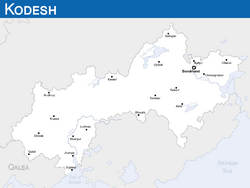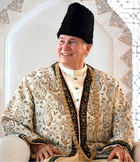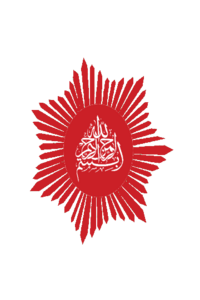Pamiran Federation
Kodesh Qodeşistan قوديشييي صولتانليق | |
|---|---|
 | |
| Capital | Burukhand |
| Official languages | Ömüric |
| Demonym(s) | Kodeshi |
| Government | Unitary parliamentary absolute monarchy |
• Caliph | Khermanshah |
| Mirza Alim | |
| Legislature | Grand Assembly |
| Population | |
• Estimate | 229,034,595 |
| GDP (PPP) | estimate |
• Total | $887 Billion |
• Per capita | $11,300 |
Kodesh (Ömüric: قوديسهيستان Qodeşistan), officially the Grand Omuran State (Ömüric: ضيوليتءي ولانءيي ومورييي Dewlet-i Ulan-ýi Ömüriýe] is a country in Mederia. It is bordered by to the south-west by Qalea. Burukhand is the capital and largest city. Its diverse population is estimated to be around 229 million.
Etymology
The name of Kodesh (Ömüric: Qodeşistan) can be divided into two components: the exonym Qodeş and the Safari suffix -stan meaning "place of" or "country".
The country is formally known as the Grand Omuran State (Ömüric: ضيوليتءي ولانءيي ومورييي Dewlet-i Ulan-ýi Ömüriýe, Ürüqish: ولان ومورلو ضويليتي Ulan Ömürlü Dewleti, Safari: بوزورگي اموريستون Buzurgi Âmûriston), and is sometimes referred to as Omure and Omuristan.
History
Geography
Politics
Government
Kodesh is an absolute monarchy. The country's constitution, an uncodified collection of royal decrees, sets out that the sultan must comply with Irsadic law, and do nothing to contradict the message of the Nashwad. No organised political parties or national elections are permitted. Critics regard it as a totalitarian autocracy lacking any sign of democracy, and it is often rated high among the most authoritarian governments in Gaia.
In the absence of national elections and political parties, politics in Kodesh takes place in three distinct arenas: within the royal family and court, between the court and the provincial governors (häkim), and between the provincial governors and the rest of Kodeshi society. The provincial governors are themselves often de facto hereditary positions which mimic the royal court on a smaller scale. Outside of the royal and provincial courts, participation in the political process is limited to a relatively small segment of the population and takes the form of the royal court consulting with the ulema, tribal leaders (baştutan) and members of important commercial families on major decisions.
By custom, all males of full age have a right to petition the sultan directly through the traditional tribal meeting known as the maslahat. In many ways the approach to government differs little from the traditional system of tribal rule. Tribal and ethnic identity remains strong and, outside of the royal court, political influence is frequently determined by tribal affiliation, with baştutans maintaining a considerable degree of influence over local and national events. Attempts to widen political participation over the past century have failed due to internal resistance, though since the 1960s several 'extra-ordinary' parliaments (mejlis) have been called to examine certain crises, though members were appointed or elected on limited suffrage.
Foreign Relations and Military
Administrative Divisions
Demographics
Ethnic Groups
The word Ömür or Ömüran (Ömürler) also has a wider meaning in a historical context because, at times, especially in the past, it has been used to refer to all Muridin inhabitants of Kodesh irrespective of their ethnicity. The question of ethnicity in modern Kodesh is a highly debated and difficult issue.
Since 1968, census have included the option of ethnicity. Ömüran is commonly defined as a civic identity, as it includes members of all ethnicities and languages bound by citizenship, loyalty to the House of Ömür, and primary or secondary use of the Ömüric dialect of Ürüqic. Most Ömürans also identify either as the various Türük or Pihranic peoples ethnically, and the numbers change depending on the representation of the question.
Languages
Religion
There are no official statistics of people's religious beliefs nor is it asked in the ordinary census. According to the government, 96.2 percent of the Kodeshi population is Muridin; other sources have given estimates ranging from as much as 98.4 percent to as low as 82 percent. The most popular sect is the Iqbali school
The Sultan is considered the highest religious authority in the country, though the active interpretation of the Iqbali school of thought, operation of the country's 70,000 registered masjids and mazārs, and employment of local and provincial imams is by the Ministry of Religious Affairs. In a special 2016 survey on religious affiliation; 96% of respondents indicated they were Muridins, followed by 3% who said they were Alydian, and 1% who affiliated with other religions or none.




